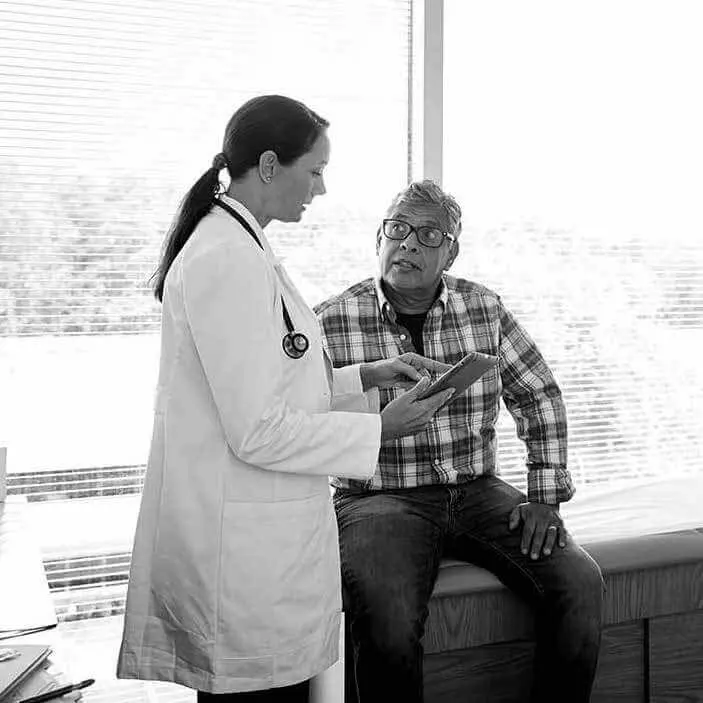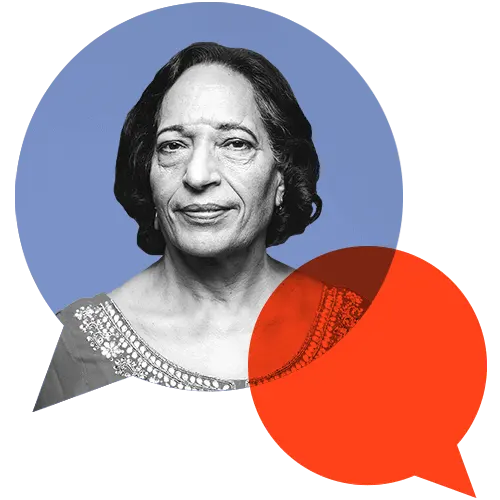Alzheimer's - Screening, Detection and Diagnosis
Not all memory issues are signs of Alzheimer’s disease. Screening is essential to determine whether symptoms are a normal part of aging or something more serious. There are many methods for finding out, but all share a common goal: to identify potential causes early and provide you with more options if you receive a diagnosis of Alzheimer’s disease or related dementia.



How is Alzheimer’s Diagnosed?
Diagnosing Alzheimer's requires careful screening and evaluation. UsAgainstAlzheimer’s helps you better understand the tools and processes for Alzheimer’s screening, so you and your loved ones can make informed decisions based on your needs.
It helps to understand the early symptoms of Alzheimer’s disease. As a first step you can take the BrainGuide memory questionnaire which can help guide you toward information and resources. The memory questionnaire does not diagnose Alzheimer’s disease or any other disease, but the results of the questionnaire can be helpful to you and your provider.

Talking with a Doctor
When signs of dementia or Alzheimer’s appear, it's important that you get a screening.
A visit to the doctor can feel scary or confusing. It can be especially hard for someone with memory problems. Preparing ahead of time can help you and your loved one. Think about what you want to say and what you want to ask. This will help the doctor understand your loved one’s symptoms. Then, they can give you and your loved one the information you need to know.

Steps Towards Alzheimer’s Diagnosis

Ask About Alzheimer’s Screening at Annual Visit

Exams for an Accurate Screening and Alzheimer’s Diagnosis:
During your doctor’s appointment, you should expect your doctor to complete a series of exams to help evaluate memory and cognitive skills, changes in personality or behaviors, and the potential causes of any symptoms. Your doctor will check your sense of sight and hearing, along with your coordination and balance. This neurological exam is a key element to understanding if another condition may be causing the memory concerns.
Your doctor may also suggest a neuropsychological exam. This exam will reveal cognitive strengths and weaknesses and allow you to discuss if concerns are part of normal aging, a neurological illness, depression, anxiety or other causes.
Complete Blood Count test will count levels of red and white blood cells, hemoglobin, hematocrit, and platelets. An unusual increase or decrease in cell counts may call for further evaluation.

Discover How Alzheimer’s Blood Tests Are Helping Detect Alzheimer’s Early
Alzheimer’s blood tests are a new way to help diagnose the disease by detecting proteins in the blood linked to brain changes. While not widely available or covered by insurance, these tests can help doctors determine if memory issues are caused by Alzheimer’s. If you notice memory or thinking changes, talk to your doctor about these tests as part of a broader evaluation. Early detection is important for managing brain health.

Tests to Confirm a Diagnosis
Frequently Used Tests to Diagnose Alzheimer’s Disease. If you or a loved one is noticing memory or behavior changes, there are tests to confirm an Alzheimer’s diagnosis. Doctors use medical history, exams, lab tests, memory tests, and brain scans like MRI, CT, and PET. Blood tests may also help rule out other conditions. These tests help doctors understand brain function and guide care. Early detection is key to managing Alzheimer’s and getting the right support.

Hearing Health for a Healthy Brain
Untreated hearing loss can raise the risk of dementia. Taking care of your hearing keeps your brain sharp and improves your well-being. Follow these simple steps to protect your hearing and stay connected as you age. Start today—your brain will thank you!
What Are The Benefits of an Early Alzheimer’s Diagnosis?
Early Alzheimer’s diagnosis can help give you or your loved one more time, which is the most valuable resource of all.
Time will allow you and your loved ones to plan for the future. Recent studies have also shown that making lifestyle changes can help delay the onset of Alzheimer’s symptoms. Adopting a healthier diet can help improve brain health. Becoming more socially active can increase your cognitive health and responsiveness and reading more can help increase brain activity.
There are many ways you can learn how to live with Alzheimer’s disease. You can also find local resources for Alzheimer’s patients and caregiver's resources that can be consulted.

Talking with a Doctor
When signs of dementia or Alzheimer’s appear, it's important that you get a screening.
A visit to the doctor can feel scary or confusing. It can be especially hard for someone with memory problems. Preparing ahead of time can help you and your loved one. Think about what you want to say and what you want to ask. This will help the doctor understand your loved one’s symptoms. Then, they can give you and your loved one the information you need to know.

Steps Towards Alzheimer’s Diagnosis

Ask About Alzheimer’s Screening at Annual Visit

Exams for an Accurate Screening and Alzheimer’s Diagnosis:
During your doctor’s appointment, you should expect your doctor to complete a series of exams to help evaluate memory and cognitive skills, changes in personality or behaviors, and the potential causes of any symptoms. Your doctor will check your sense of sight and hearing, along with your coordination and balance. This neurological exam is a key element to understanding if another condition may be causing the memory concerns.
Your doctor may also suggest a neuropsychological exam. This exam will reveal cognitive strengths and weaknesses and allow you to discuss if concerns are part of normal aging, a neurological illness, depression, anxiety or other causes.
Complete Blood Count test will count levels of red and white blood cells, hemoglobin, hematocrit, and platelets. An unusual increase or decrease in cell counts may call for further evaluation.

Discover How Alzheimer’s Blood Tests Are Helping Detect Alzheimer’s Early
Alzheimer’s blood tests are a new way to help diagnose the disease by detecting proteins in the blood linked to brain changes. While not widely available or covered by insurance, these tests can help doctors determine if memory issues are caused by Alzheimer’s. If you notice memory or thinking changes, talk to your doctor about these tests as part of a broader evaluation. Early detection is important for managing brain health.

Tests to Confirm a Diagnosis
Frequently Used Tests to Diagnose Alzheimer’s Disease. If you or a loved one is noticing memory or behavior changes, there are tests to confirm an Alzheimer’s diagnosis. Doctors use medical history, exams, lab tests, memory tests, and brain scans like MRI, CT, and PET. Blood tests may also help rule out other conditions. These tests help doctors understand brain function and guide care. Early detection is key to managing Alzheimer’s and getting the right support.

Hearing Health for a Healthy Brain
Untreated hearing loss can raise the risk of dementia. Taking care of your hearing keeps your brain sharp and improves your well-being. Follow these simple steps to protect your hearing and stay connected as you age. Start today—your brain will thank you!
What Are The Benefits of an Early Alzheimer’s Diagnosis?
Early Alzheimer’s diagnosis can help give you or your loved one more time, which is the most valuable resource of all.
Time will allow you and your loved ones to plan for the future. Recent studies have also shown that making lifestyle changes can help delay the onset of Alzheimer’s symptoms. Adopting a healthier diet can help improve brain health. Becoming more socially active can increase your cognitive health and responsiveness and reading more can help increase brain activity.
There are many ways you can learn how to live with Alzheimer’s disease. You can also find local resources for Alzheimer’s patients and caregiver's resources that can be consulted.



